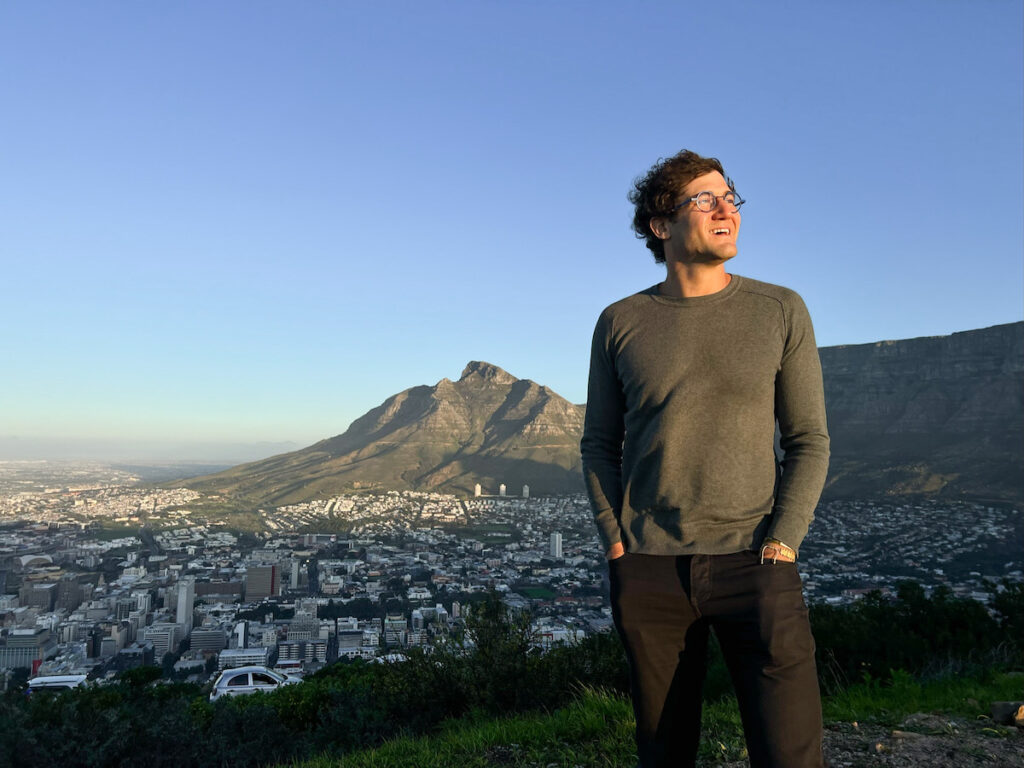Photo by Je’nine May
The stirring of data with digital communication is beautiful music to Josh Sandler. His cool jams are those virtual flows to the cloud that show cargo moving efficiently throughout sub-Saharan Africa.
“I understand — people don’t find logistics very sexy,” admits Sandler. “But logistics, to me, is extremely sexy.”
It is this enthusiasm for what some consider a leaden business practice that drives Sandler’s business in Kenya, Uganda, Nigeria and 10 other countries. He is the founder of Lori Systems, a transportation management system for cargo that covers thousands of miles across East Africa, much of it what we consider “frontier.”
Sandler, 35, says he always knew he wanted to come back to the continent where he was born to participate in its rapidly emerging economies. He has done that by finding his sweet spot: the logistics of moving cargo.
“The continent contains a lot of diverse communities and languages, and I’m constantly learning and trying to be aware of my innate ignorance of just not knowing things,” Sandler says. “And I think that’s the beautiful part of the journey, just learning and meeting people and connecting.
“There is a lot of growth happening on the continent. For a while, seven out of the top 10 fastest-growing economies were (here). The continent has the world’s youngest population and exponential growth potential.”
Africa, which has 17% of the global population, has more than 400 companies with $1 billion in earnings, according to the Brookings Institution. There are 46 countries in sub-Saharan Africa with about 1.2 billion people. Sandler says $180 billion is spent on the continent in annual logistics costs.
Lori Systems has tapped into a spigot that is wide open for commerce. After just six years, his company is one of the largest technology platforms in Africa, recognized as the fastest-growing startup on the continent by Fast Company and the winner of TechCrunch Battlefield Africa.
One can routinely gauge the substance of a company by the long-hold of its investors, and Lori Systems’ include DST, Hillhouse, Google and other leading venture capital firms.
Born in Johannesburg, South Africa, before moving to Savannah with his family — his father is a doctor — Sandler acquired an ethos of entrepreneurship and community from two South African-born uncles, Michael Sandler and Steve Jacobs.
“They were both very non-traditional in their business approach,” Sandler says. “Michael created a large hedge fund, and he taught me how to just go in and grind it out. Steve talked about the importance of working with the community.”
The Terry College also played a significant role in the development of his business ethos. Sandler says the college etched a sense of enterprise and valuing the community into his psyche. His classmates came from a variety of social and economic backgrounds, and he recognized the benefits of the competing thought they brought with them.
Sandler also says in Athens there was an energy to do more — an energy he carried with him to Harvard for his graduate studies. His dissertation was on the fundamental challenges the private sector can address in emerging economies.
In 2016, Sandler began addressing one of those issues, logistics, by creating Lori Systems, where he now serves as chairman after handing off CEO duties in 2021.
In the U.S., the supply chain is dominated by the brown truck (UPS) and the white truck (FedEx) and the crowd-sourced methods for moving packages the last mile. The logistics costs associated with the sale of a bag of rice in the U.S. can be 6% to 8%. In Kenya, Sandler says, it can be 25% to 40%.
Lori’s task is to find ways to make the market more efficient and reduce the costs of moving that bag of rice while keeping it “visible” in the supply chain to customers shipping cargo.
“We started out with a basic marketplace — finding cargo, finding trucks and helping manage the trucks — but we have progressively tied in more comprehensive technologies,” Sandler says. “We created a new platform that allowed you to manage all the long haul you are moving with payments, visibility and alerts all built in — a one-stop solution. It is quite effective.”
Sandler says the continent is rapidly driving supply chain improvements in part for two reasons. First, there is high technology adoption across markets. Second, supply chain management companies such as Lori learned from and adapted to the pandemic. They were knocked back on their heels, but they recovered.
“The pandemic forced a lot of tech companies to make an analysis and see how they could be more efficient because they had more limited resources,” Sandler says. “We had to optimize with limited resources and drive as much efficiency as possible.”
There is another riveting aspect to Sandler’s quest, something that embodies Lori’s ethos.
“In order to build this business, we rode around with (truckers) and saw how it really is on a day-to-day basis,” Sandler says. “It helped to get their perspective by embedding ourselves with them. It was not solving a theoretical problem — it was solving a problem that is tangible and real.”
It was that level of commitment allowing Lori to jump in and help East Africa navigate COVID. Sandler says great customer service translated well to supporting the ecosystem that arose to deal with the pandemic.
“There were many fewer cash injections than in the U.S., and we were well placed to help coordinate relief efforts. For example, we worked with our network of truckers to deliver containers donated from Maersk to support disbursement of donated food through (the nonprofit) Somo and connected them with SafeBoda motorcycles to help disperse the food.
“I think that was quite a beautiful thing, just seeing communities work together.”
For Sandler, that’s the beautiful music of logistics.

